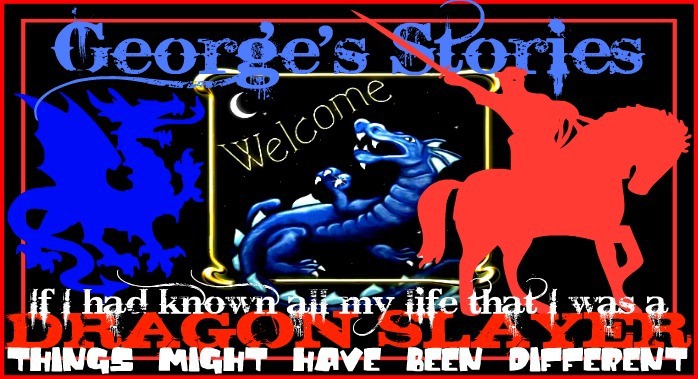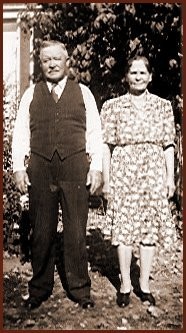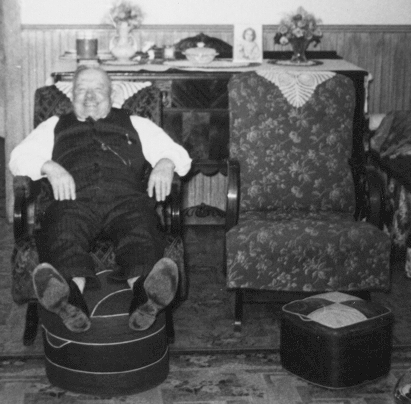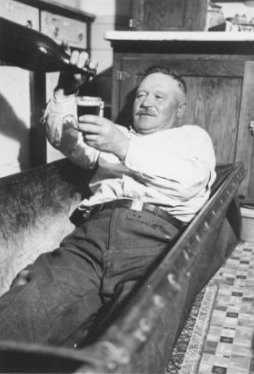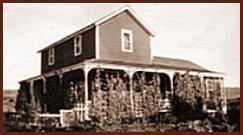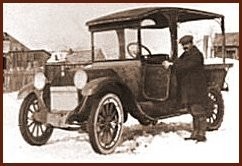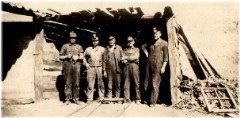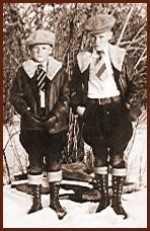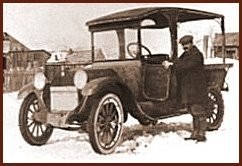Grandpa and His Pickup
By Mike Kuzara, Wyarno, Wyoming, May 2008
I wish I had my Grandpa's pickup, or as he would say, "peek-op." You know the kind with the outside flaring fenders, the windshield that
cranked open, the headlights on their own little pedestals, and the gearbox that gave its' own distinctive whine? It was a sort of universal gray, dented and scratched here and there, and Grandpa
could make it go just about anywhere, anytime.
Summer pasture was a place referred to as the 'dry farm' and almost every day I got to accompany Grandpa there to check the cows. "We count
cow, then we look at fence, ya?" Grandpa would say. So up and down hill, and around impossible side hills we would go with all of the fencing stuff crashing and rumbling around in the back battering
the cargo space with a hundred more dents.
Some of the side hills were a contest to defy gravity, but Grandpa always seemed to win. "You scare?" he would ask, looming over me from the
up-hill side. "N-n-n-o!" I would croak. But I'm sure the white knuckles and the wide eyes gave denial to the admission.
Most fun of all was the trip back, because Grandpa, being just a big kid, played a game of seeing how far we could coast. At the crest of the first hill, he would shut off the
engine, turn to me with a Teddy Roosevelt grin, and say, "Now we save gas!" We'd whiz down the first decline, and lose speed as we squeaked and rumbled up the next, tip over the top, then pick up
speed going down the next.<br><br>
All summer long Grandpa had been hitting the first hill a little faster, and as the dry Autumn wore on, the soft dirt road became harder,
and of course, faster. August, and school would be starting soon so our summer together was about to end. We were back at the far side of the dry farm when, with a grin, and a twinkle in his eye,
Grandpa said, "This time we go all the way to highway!" We sailed around the corner before the first hill, sliding sideways in the dirt, then Grandpa caught another gear, and when we cleared the top,
there was this 'carnival ride' feeling in my tummy!
Around two small corners and down the first decline we flew with the wind shrieking through the cab via the open windshield vent, then up
over the top of the next hill where we actually went airborne, then down the next decline with those old 'knobby' tires singing like I'd never heard them sing before! I should mention here that there
were two right angle corners at the bottom of the last hill. We fishtailed through the first one, but Grandpa lost it on the second corner and over we went.
The next thing I knew there was this terrific pressure on me. It was Grandpa. He was reaching up and opening the left-hand door as mine was
flat on the ground. He flipped it open, pulled himself through, then reached down and pulled me out. I knew Grandpa was strong, but what he did next was amazing to me. The pickup was on its side and
he just squatted down, lifted, and flipped it back up on its wheels! After we gathered up all of the stuff that had fallen out, Grandpa started the truck and we drove home real, real
slow.
"You OK?" he asked. I nodded yes. We drove a little way. "You want some pop?" I brightened, and nodded yes. We drove a little farther. "You
want some candy?" This was getting better all the time! "Yeah!" I said. We drove on some more. "you won't tell Mama?"
When we came into the yard still going REAL slow, Grandma's radar kicked in. She circled the pickup before we even got stopped. Now I'd
heard a lot of Polish because that's what Grandpa and Grandma used when they didn't want me to know what they were talking about, or maybe it was just handier for them. However, I heard Polish I'd
never heard before with Grandpa shuffling to the house and Grandma pecking at him like one of those feisty sparrows you sometimes see badgering a hawk.
Worst of all, I didn't get my pop and candy!
Mike Kuzara, Wyarno, Wyoming
